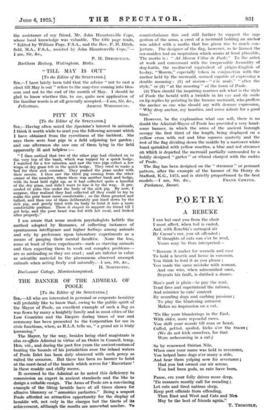PITY IN PIGS [To the Editor of the SPECTATOR.] Sm,—Having
often noted the Spectator's interest in animals, I think it worth while to send you the following account which I have obtained from the eyewitness of the incident. She says there were four pigs in a field adjoining her garden ; and one afternoon she saw one of them lying in the field apparently ill and helpless :- " I then noticed that two of the other pigs had climbed on to the very top of the bank, which was topped by a quick hedge.
watched for a few minutes, and saw the two pigs collect a few .wisps of dry grass left in the quick hedge. They tried to make a :bed for their sick comrade. They pushed the grass wider with their snouts. I then saw the third pig coming from the other corner of the meadow, where there was another bank and hedge, with its head held right up, as it had collected quite a handful of the dry grass, and didn't want to lose it by the way. It pro- ceeded to poke. this under the body of the sick pig. By now, I suppose, they realized they had collected all they could to try to make the poor beast more comfortable ; so the three grunted and talked, and then one of them deliberately put itself down by the sick pig, and gently tried with its body to hoist it into a more comfortable position. There it stayed to support its friend till I got help, and the poor beast was fed with hot meal, and looked after properly."
I am aware that some modern psychologists belittle the method adopted by Romance, of collecting instances of spontaneous intelligence and higher feelings among animals and rely by preference upon laboratory experiments as a means of gauging their mental faculties. None the less, some at least of these experiments—such as starving animals and then expecting them to work out complex problems— are as misleading as they are cruel ; and are inferior in value as scientific material to the phenomena observed amongst animals when acting freely and naturally.—I 'am, Sir, &c., H. NORTRCOTE.
Ducksmoor College, Moretonhampstead.














































 Previous page
Previous page